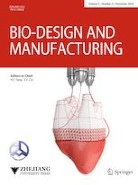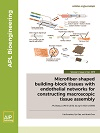
Annual Review of Biomedical Engineering
Scope & Guideline
Advancing the Frontiers of Biomedical Innovation
Introduction
Aims and Scopes
- Biomaterials and Tissue Engineering:
Focuses on the development and application of biomaterials for tissue regeneration, including the engineering of scaffolds and organoids. - Medical Devices and Sensors:
Covers advances in medical devices, including wearable sensors and imaging technologies that enhance patient monitoring and diagnosis. - Drug Delivery Systems:
Explores innovative drug delivery methods, including nanotechnology and microfluidics, aimed at improving therapeutic efficacy. - Regenerative Medicine:
Investigates strategies for tissue repair and regeneration, including stem cell therapy and gene editing techniques. - Bioinformatics and Systems Biology:
Integrates computational methods with experimental data to model biological systems and predict outcomes in biomedical research. - Neuroengineering:
Focuses on technologies and methods for interfacing with the nervous system, including brain-machine interfaces and neuroprosthetics. - Mechanobiology:
Studies the mechanical properties of cells and tissues and their influence on biological processes, particularly in disease contexts.
Trending and Emerging
- Immunomodulation and Biologics:
Recent publications emphasize the role of immunomodulatory therapies and biologics, particularly in the context of autoimmune diseases and transplants, showcasing advancements in personalized medicine. - Advanced Drug Delivery Technologies:
There is a significant increase in research focused on innovative drug delivery systems, particularly those utilizing nanotechnology and microfluidics for targeted therapies. - Artificial Intelligence and Big Data in Healthcare:
The integration of AI and big data analytics into biomedical engineering is gaining momentum, with studies exploring predictive models and personalized treatment strategies. - Wearable and Implantable Sensors:
Emerging trends highlight the development of advanced biosensors that combine implantable and wearable technologies for real-time health monitoring. - 3D Bioprinting and Biofabrication:
An increase in research on biofabrication techniques, including 3D printing of living tissues and organs, reflects a growing interest in regenerative medicine and custom tissue engineering. - Neurotechnology and Brain-Machine Interfaces:
Research in neurotechnology is expanding, focusing on interfaces that enhance communication between the brain and external devices, particularly for rehabilitation and assistive technologies.
Declining or Waning
- Traditional Imaging Techniques:
There has been a noticeable reduction in the publication of papers focused solely on traditional imaging methods, as newer modalities such as photoacoustic and molecular imaging gain traction. - Basic Biomedical Research:
Research purely focused on basic biomedical science without direct engineering applications appears to be waning, as the journal shifts towards more applied engineering solutions. - Conventional Drug Development:
Publications centered around conventional pharmaceutical drug development processes are declining in favor of more innovative approaches such as personalized medicine and targeted delivery systems. - Standard Prosthetics and Orthotics:
The focus on conventional prosthetic and orthotic designs is diminishing, with more attention now on advanced integration and human-machine interactions. - Non-Integrated Healthcare Solutions:
There is a decreasing emphasis on non-integrated healthcare solutions that do not consider the convergence of technology with patient-centered care.
Similar Journals

JOURNAL OF BIOMEDICAL MATERIALS RESEARCH PART A
Advancing biomaterials for a healthier tomorrow.JOURNAL OF BIOMEDICAL MATERIALS RESEARCH PART A, published by WILEY, is a leading journal in the field of biomaterials and biomedical engineering, showcasing cutting-edge research that bridges the gap between material science and healthcare applications. With a robust 2023 impact factor reflecting its high-quality contributions, this journal is classified in the Q2 quartile for Biomaterials, Biomedical Engineering, and Ceramics and Composites, while achieving an impressive Q1 ranking in Metals and Alloys. The journal caters to a diverse readership, including researchers, professionals, and students, aiming to facilitate innovation and advancements in biocompatible materials and their applications in medical devices and tissue engineering. Access options for readers are available, ensuring the latest studies and findings are readily accessible to all stakeholders in this dynamic field. As it progresses towards its 2024 target, the JOURNAL OF BIOMEDICAL MATERIALS RESEARCH PART A continues to be an essential resource for anyone involved in the development and application of biomedical materials.

Bioengineering & Translational Medicine
Bridging Bioengineering and Medical BreakthroughsBioengineering & Translational Medicine, published by WILEY, positions itself at the forefront of innovation in the fields of biomedical engineering, biotechnology, and pharmaceutical science. With an impressive impact factor reflected through its top-tier Q1 rankings in multiple categories, the journal serves as a critical platform for disseminating cutting-edge research and stimulating discourse among professionals and scholars since its establishment as an open-access journal in 2016. Key to its mission is facilitating the translation of bioengineering research into tangible medical applications, thereby enhancing healthcare outcomes. With its comprehensive scope, it attracts a diverse readership, including researchers, industry leaders, and students eager to engage with the latest developments in translational medicine. The journal operates under robust access options, ensuring that research is freely available for maximum reach and impact, fostering collaboration and innovation across disciplines worldwide.

Bio-Design and Manufacturing
Pioneering Sustainable Practices in Bio-DesignBio-Design and Manufacturing, published by SPRINGER HEIDELBERG, is a pioneering journal that stands at the forefront of innovation in the fields of Biomedical Engineering, Biotechnology, Industrial and Manufacturing Engineering, and Materials Science. With its ISSN 2096-5524 and E-ISSN 2522-8552, this journal has established itself as a leading platform for disseminating cutting-edge research and advancements that merge biological principles with manufacturing processes, emphasizing sustainable and efficient practices. It has garnered recognition in the 2023 category quartiles, boasting a Q1 rank in all its relevant fields, which underscores its significance and impact—evident from its prime Scopus rankings that place it within the top percentiles of numerous engineering and materials science disciplines. Researchers, professionals, and students alike benefit from the wealth of knowledge presented in this journal, making it an essential resource for those seeking to enhance their understanding of bio-design applications and innovation in manufacturing processes.

Regenerative Biomaterials
Pioneering Innovations in Tissue EngineeringRegenerative Biomaterials, published by Oxford University Press, serves as a premier platform for the dissemination of innovative research in the rapidly evolving field of biomaterials. Since its inception in 2014, this esteemed open-access journal has fostered a collaborative and diverse scientific community, providing free access to impactful articles that enhance our understanding of regenerative medicine and tissue engineering. With a commendable impact factor and ranking within the top quartiles of both Biomedical Engineering and Materials Science, it is recognized for its rigorous peer-review process and high-quality publications. The journal aims to bridge the gap between fundamental research and applied sciences, promoting advanced studies that contribute to clinical applications and regeneration strategies. Researchers, practitioners, and students alike are encouraged to engage with the journal’s content to foster interdisciplinary collaboration and drive future innovations in the biomaterials domain.

Journal of Biological Engineering
Elevating Interdisciplinary Collaboration in Biological SciencesJournal of Biological Engineering, published by BMC, stands as a prominent Open Access journal since 2007, dedicated to advancing the interdisciplinary field of biological engineering. With an ISSN of 1754-1611, this UK-based journal aims to provide a platform for researchers and professionals to disseminate innovative and impactful research across various domains including Biomedical Engineering, Environmental Engineering, Cell Biology, and Molecular Biology. The journal's notable rankings in the 2023 category quartiles exemplify its position within the scientific community, featuring Q2 status in Biomedical Engineering and Environmental Engineering, along with Q3 in Cell Biology and Q2 in Molecular Biology. By maintaining robust Scopus rankings and ensuring free access to cutting-edge research, the Journal of Biological Engineering plays a crucial role in driving discovery and collaboration among scholars, thereby enriching both the academic landscape and applied sciences.

Progress in Biomedical Engineering
Empowering research that shapes the future of healthcare.Progress in Biomedical Engineering, published by IOP Publishing Ltd, is a premier open-access journal that serves as a vital platform for the dissemination of innovative research in the field of biomedical engineering. With an impressive Q1 classification in the Biomedical Engineering category for 2023, this journal has established itself as a significant contributor to the advancement of engineering solutions that improve healthcare outcomes. Recognized for its high-quality and impactful publications, it ranks 51st out of 303 in its field on Scopus, placing it in the 83rd percentile. The journal aims to foster interdisciplinary collaboration and introduce pioneering methodologies and technologies that bridge the gap between engineering and medicine. By providing a pathway for rapid communication of fundamental and applied research, Progress in Biomedical Engineering is dedicated to shaping the future of healthcare technology. Access to its content ensures that researchers, professionals, and students remain at the forefront of biomedical innovation.

Biomedical Materials
Shaping Tomorrow's Healthcare with Cutting-Edge Materials.Biomedical Materials, published by IOP Publishing Ltd, is a premier journal dedicated to the rapidly evolving field of biomedical engineering and materials science. With a robust impact factor showcasing its influence, this journal serves as a vital platform for disseminating pioneering research from 2006 to 2024. Covering an array of interdisciplinary topics—ranging from biomaterials to bioengineering and applied chemistry—the journal consistently ranks in the second quartile across multiple categories including Bioengineering (Q2), Biomaterials (Q2), and Biomedical Engineering (Q2) as of 2023. Researchers, professionals, and students alike benefit from its contributions, exploring innovative solutions at the intersection of biology and material science. Although not an Open Access journal, Biomedical Materials remains essential in advancing our understanding and facilitating discussions surrounding state-of-the-art materials that revolutionize medical applications and enhance patient care.

Tissue Engineering Part B-Reviews
Bridging Disciplines for Tomorrow's Medical Innovations.Tissue Engineering Part B-Reviews is a premier academic journal published by MARY ANN LIEBERT, INC, focusing on the interdisciplinary field of tissue engineering and regenerative medicine. With an impressive impact factor that places it in the Q1 category across multiple relevant fields—including Biochemistry, Bioengineering, Biomaterials, and Biomedical Engineering—this journal provides a vital platform for researchers and professionals to disseminate cutting-edge findings and comprehensive reviews. Covering a vast scope from 2008 to 2024, the journal is committed to advancing knowledge in the application of engineering principles to biological tissues, making it an indispensable resource for those at the forefront of biomedical innovation. While the journal does not currently offer open access options, its rigorous peer review process ensures high-quality contributions that are essential for academic and practical advancements. The journal's rankings in Scopus reflect its significance, catering to a diverse audience of students, researchers, and practitioners seeking the latest insights in this dynamic field.

APL Bioengineering
Innovating at the Intersection of Science and MedicineAPL Bioengineering is a premier open-access journal published by AIP Publishing, dedicated to advancing the field of bioengineering and its interdisciplinary applications. Established in 2017, this journal serves as a vital platform for researchers, professionals, and students interested in the critical intersections of bioengineering, biomaterials, biomedical engineering, and biophysics. With an impressive impact factor and consistent rankings in the Q1 category across multiple domains, including biochemistry and materials science, APL Bioengineering has positioned itself among the top journals in its field. The journal aims to publish innovative original research, comprehensive reviews, and insightful case studies that further the understanding and application of bioengineering principles. Since its inception, APL Bioengineering has fostered a community of thought leaders, providing open access to ensure broad dissemination of knowledge and advancements that underpin the future of biomedical innovation.

Advanced Biomedical Engineering
Advancing the future of health through engineering excellence.Advanced Biomedical Engineering is a peer-reviewed open access journal published by the Japanese Society for Medical & Biological Engineering, dedicated to disseminating high-quality research in the multidisciplinary fields of biomedical engineering. Boasting an ISSN of 2187-5219, this journal has been pivotal since its inception in 2018, especially as it embraces the open access model to foster knowledge sharing and wide accessibility. Centered in Tokyo, Japan, it serves as a vital platform for scholars and practitioners across various domains, such as biomaterials, biomedical engineering, and biotechnology. Despite currently residing in the Q4 quartile across several categories, including those in biotechnology and computer science applications, the journal is committed to elevating its academic impact and reputation, aiming for improved rankings in Scopus and other databases. Researchers and professionals are encouraged to contribute their innovative findings, discussions, and case studies, facilitating the advancement of this dynamic field.